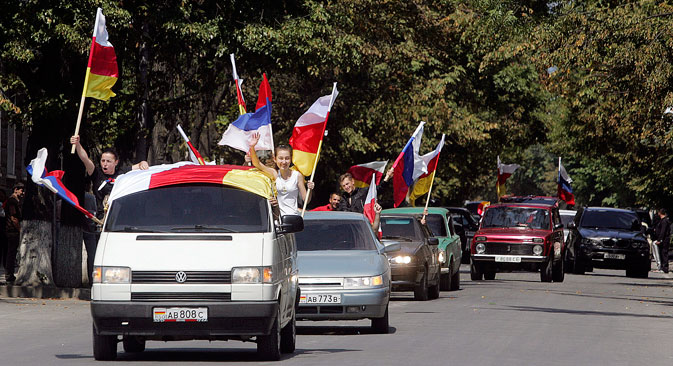
South Ossetia is a partially recognized republic. Its independence from Georgia is recognized by Russia, Nicaragua, Venezuela and the Pacific islands of Nauru and Tuvalu. Source: Reuters
ReutersLeonid Tibilov, the president of the breakaway Georgian republic of South Ossetia, is planning to hold a referendum in the territory on joining Russia.
As reported by the South Ossetian presidential press service, he made the announcement at a meeting with Russian presidential aide Vladislav Surkov in Tskhinvali on Oct. 19.
"Today's political realities are such that we should make our historic choice," Tibilov said, adding that reunification with Russia is an age-old dream of the South Ossetian people.
However, Moscow appears not to be taking the declaration seriously and currently has no intention of setting the referendum in motion.
"Moscow is satisfied with the current pace of integration processes. There is no need to give them new incentives," Alexei Chesnakov, a former deputy head of the Presidential Administration's Internal Policy Directorate and a political analyst close to the Kremlin, told RBTH.
According to Chesnakov, Tibilov's statement only registers the immutability of South Ossetia’s strategic priorities, "but it does not mean the immediate commencement of the organizing of a referendum."
Leonid Slutsky, the chairman of the State Duma Committee for CIS Affairs, Eurasian Integration and Ties with Compatriots, also believes that the agreement on alliance and integration signed in March is enough.
The agreement, in particular, involves the merging of the South Ossetian and Russian border guard service, interior ministries and armies. In addition, he told RBTH, "Russia is investing the maximum in the economy of South Ossetia, in any case.”
Russia currently subsidizes the South Ossetian budget to the tune of more than 90 percent.
"We will respect the will of the people, but because of the difficult geo-strategic situation, this issue [accession to the Russian Federation] is problematic. I would now refrain from expressing a positive or negative opinion on the matter," said Slutsky.
However, according to Konstantin Zatulin, the director of the Institute for CIS Countries, "it is difficult to assume that such an accomplished person as the president of South Ossetia does not know about it, and has not consulted on these matters with Russia.”
Tibilov is not the only senior South Ossetian official to make such statements from time to time, and everyone there understands that stating a desire for reunification does not necessarily mean carrying out this plan, said Zatulin, pointing out that the idea is very popular with the electorate.
"It is difficult to judge why Tibilov decided to declare this now. But I definitely see the difference between South Ossetia, which is seeking to reunite with Russia, and [the other breakaway Georgian entity] Abkhazia, which hopes to build an independent state," he said.
South Ossetia is a partially recognized republic (its independence from Georgia is recognized by just five states – Russia, Nicaragua, Venezuela and the Pacific islands of Nauru and Tuvalu). Russia recognized the independence of the “republic” after Moscow’s "five-day war" against Georgia in 2008.
In a referendum on entry into the Russian Federation held in 1992, 99.89 per cent of South Ossetian voters supported the motion, while in 2006, the republic held another referendum – for the status of an independent state.
All rights reserved by Rossiyskaya Gazeta.
Subscribe
to our newsletter!
Get the week's best stories straight to your inbox